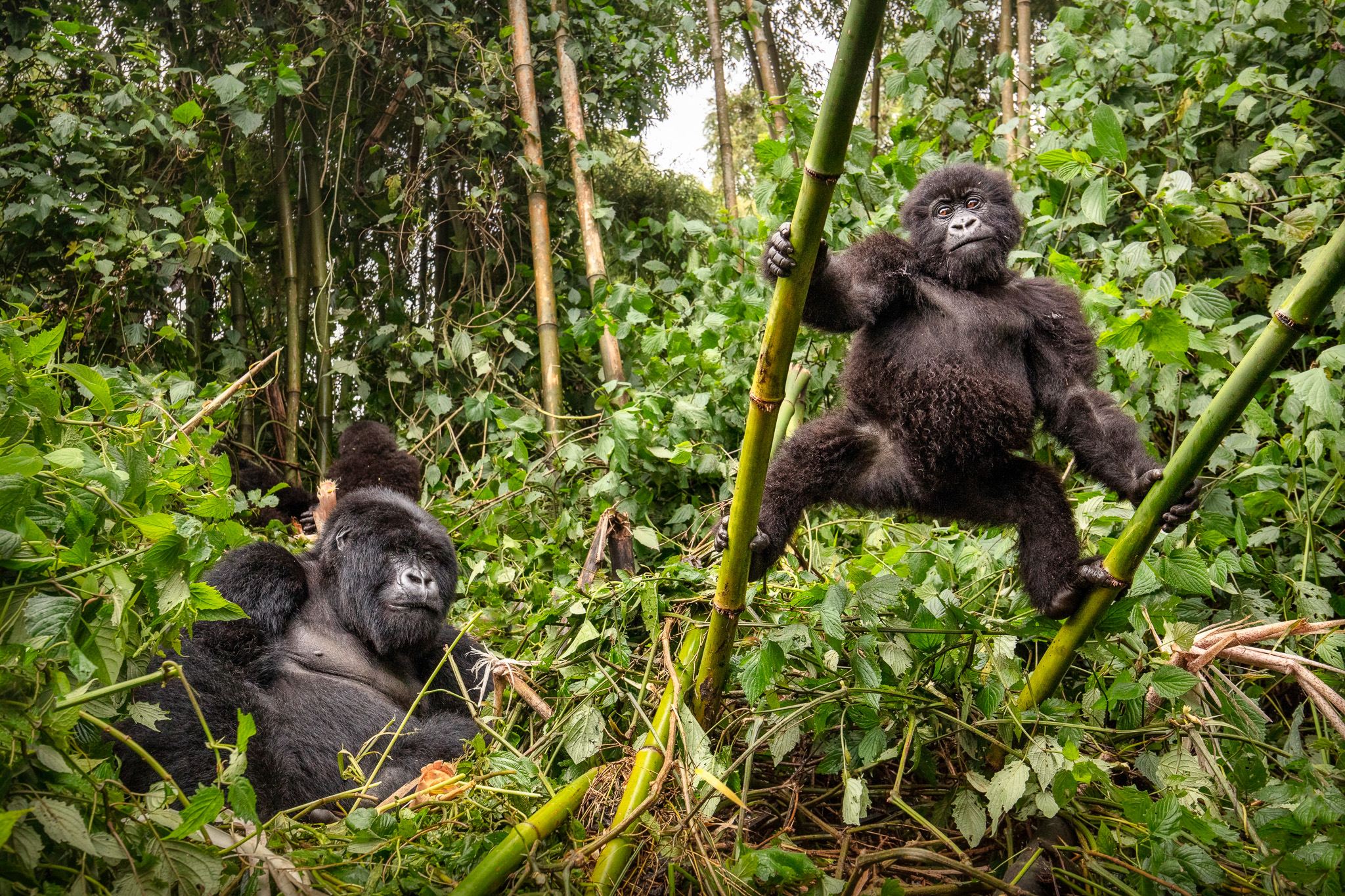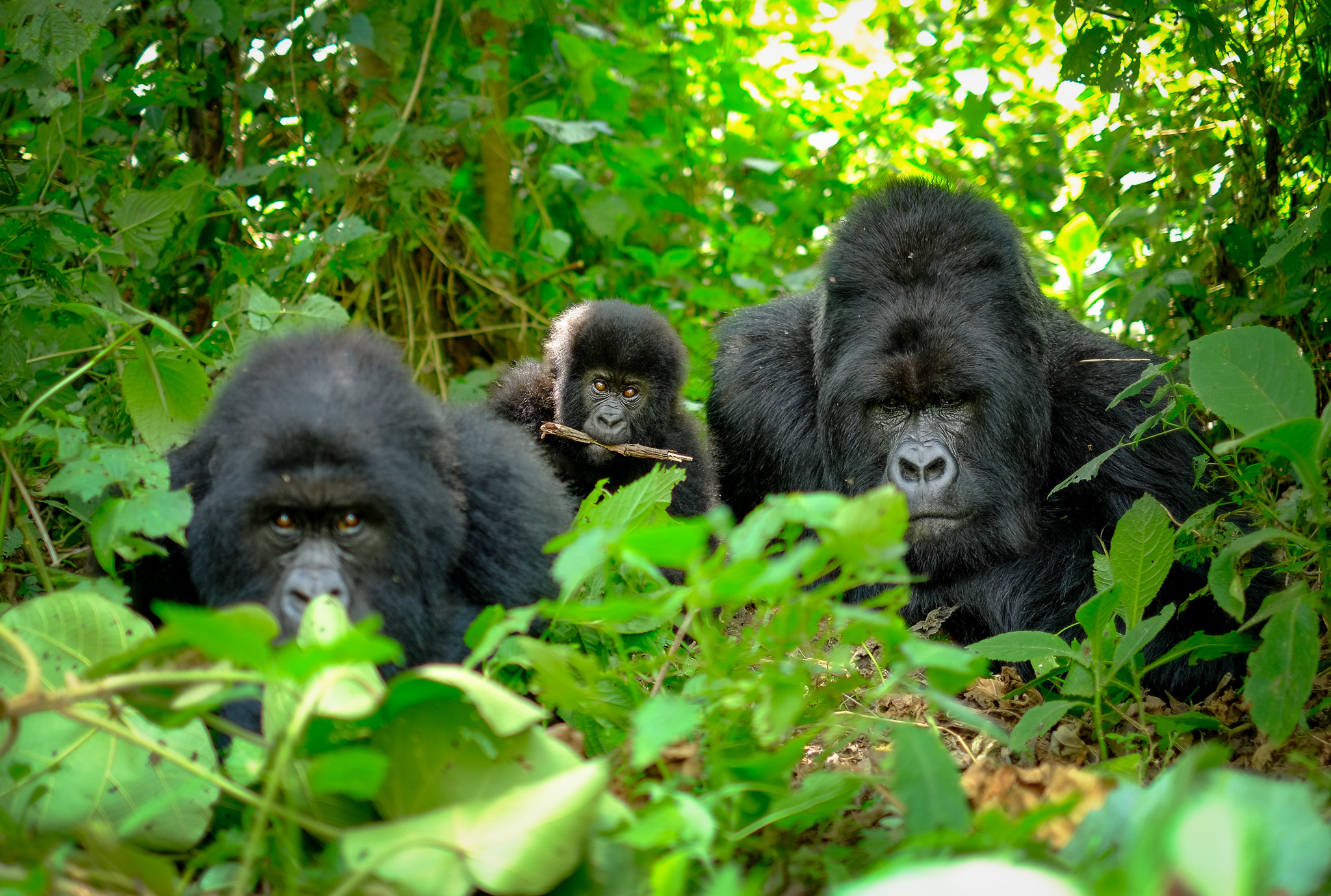World Gorilla Day: Protecting Africa’s Gentle Giants for People and Planet

Gorilla mother and baby in Volcanoes National Park, Rwanda.
In the dense rainforests of Cameroon, where towering trees filter the light and the forest hums with life, gorillas remain central to both cultural identity and ecological health. In the Dja Faunal Reserve and Campo Ma’an National Park, the African Wildlife Foundation (AWF) is supporting efforts that bring together conservation science and community leadership to protect these critically endangered apes.
Indigenous communities such as the Baka and Bagyeli, once reliant on hunting, are now actively engaged in gorilla protection. With training in wildlife monitoring, GPS navigation, and data collection, many have become forest trackers and conservation educators. Their knowledge of the forest’s rhythms, seasons, sounds, and subtle signs has proven invaluable. As one community member reflected, “We used to hunt to survive. The gorillas are now under our protection. They are part of our story and our forest.” This transformation is more than conservation; it is a story of pride, empowerment, and renewal.
Camera traps and spatial monitoring tools further enhance these community efforts. Early results from Campo Ma’an show that a significant proportion of the observed gorilla population are juveniles, an encouraging sign of stability and future growth.
“By integrating advanced technologies with the traditional ecological knowledge of local communities, we are forging a powerful and holistic approach to conservation,” says Norbert Sonne, AWF’s Cameroon Country Director.

A family of mountain gorillas in Rwanda.
Expanding Living Space in Rwanda
While Cameroon demonstrates the strength of community-led conservation, Rwanda showcases how governments and conservation partners can reshape landscapes to secure a species’ future.
In Volcanoes National Park, where more than 700 people live per square kilometer around the park’s edge, human pressure on land is intense. AWF is partnering with the Government of Rwanda to expand park boundaries, giving gorilla families more room to thrive and reducing dangerous encounters between groups.
The expansion not only eases pressure on the species but also strengthens the foundation of Rwanda’s thriving ecotourism sector, which plays a vital role in financing conservation. In Rwanda’s Virunga landscape, AWF is pioneering innovative approaches that are reshaping conservation science.
Through a partnership with NatureMetrics, AWF is applying environmental DNA (eDNA) technology to monitor ecosystems. By collecting DNA from soil, water, and even the air, researchers can track species presence without disturbing gorillas or other wildlife. This cutting-edge approach provides critical insights into how gorillas interact with their environment and offers a new way of safeguarding ecosystem health.
Crucially, this work is also preparing Rwanda’s next generation of conservation scientists. More than 20 young Rwandans are being trained in molecular ecology and eDNA sampling, equipping them with world-class expertise and ensuring that conservation leadership remains locally rooted.

Volcanoes National Park landscape in Kinigi, Rwanda.
Communities and Climate Resilience
Across both landscapes, one truth holds: Gorilla conservation is inseparable from the wellbeing of people. In Rwanda, AWF is helping communities adopt sustainable agriculture that reduces pressure on forest habitats, training villagers as wildlife monitors, and engaging students in conservation competitions and park visits that nurture environmental awareness.
At the same time, climate change is emerging as a new threat. Shifts in rainfall and prolonged droughts are altering food availability and water access in gorilla habitats. AWF is restoring native forests, protecting water sources, and reestablishing corridors to ensure that gorillas can adapt to these changing conditions. These efforts not only secure the future of gorillas but also strengthen the resilience of the communities who share their landscapes.
From Cameroon’s Indigenous-led conservation to Rwanda’s scientific innovation and park expansion, gorilla protection reflects a shared responsibility. It is a story of communities and governments working together, of traditions meeting technology, and of ecosystems sustained for generations to come.
On this World Gorilla Day, AWF’s work across Africa highlights that conserving gorillas is not only about protecting a species—it is about securing forests, empowering people, and shaping a future where wildlife and humanity thrive together.